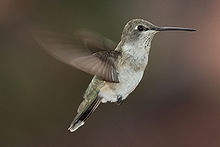Trochilidae
| Hummingbird Temporal range: Rupelian to present |
|
|---|---|
 |
|
| Female black-chinned hummingbird | |
| Scientific classification | |
| Kingdom: | Animalia |
| Phylum: | Chordata |
| Class: | Aves |
| Order: | Apodiformes |
| Family: |
Trochilidae Vigors, 1825 |
| Subfamilies | |
|
Phaethornithinae For an alphabetic species list, see: |
|
Phaethornithinae
Trochilinae
For a taxonomic list of genera, see:
For an alphabetic species list, see:
Hummingbirds are birds from the Americas that constitute the family Trochilidae. They are among the smallest of birds, most species measuring 7.5–13 cm (3–5 in). Indeed, the smallest extant bird species is a hummingbird, the 5-cm bee hummingbird weighing less than a U.S. penny (2.5 g).
They are known as hummingbirds because of the humming sound created by their beating wings which flap at high frequencies audible to humans. They hover in mid-air at rapid wing-flapping rates, typically around 50 times per second, allowing them also to fly at speeds exceeding 15 m/s (54 km/h; 34 mph).
Hummingbirds have the highest metabolism of any homeothermic animal. To conserve energy when food is scarce, and nightly when not foraging, they go into torpor, a state similar to hibernation, slowing metabolic rate to 1/15th of its normal rate.
A map of the hummingbird family tree—reconstructed from analysis of 284 of the world's 338 known species—shows rapid diversification from 22 million years ago. Hummingbirds fall into nine main clades, the Topazes, Hermits, Mangoes, Brilliants, Coquettes, Patagona, Mountain Gems, Bees, and Emeralds, defining their relationship to nectar-bearing flowering plants and the birds' continued spread into new geographic areas.
While all hummingbirds depend on flower nectar to fuel their high metabolisms and hovering flight, coordinated changes in flower- and bill shape stimulated the formation of new species of hummingbirds and plants. Due to this exceptional evolutionary pattern, as many as 140 hummingbird species can coexist in a specific region, such as the Andes Mountains.
...
Wikipedia
